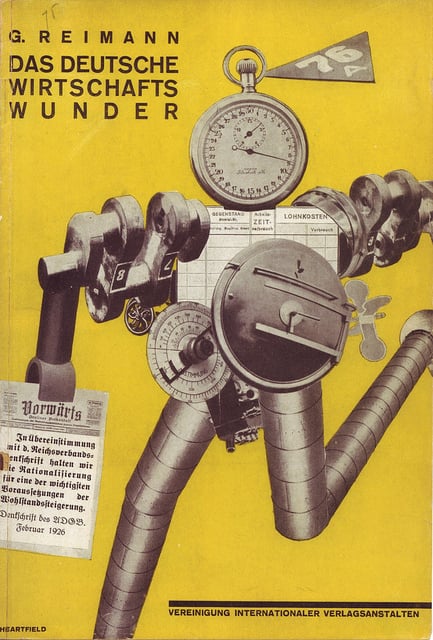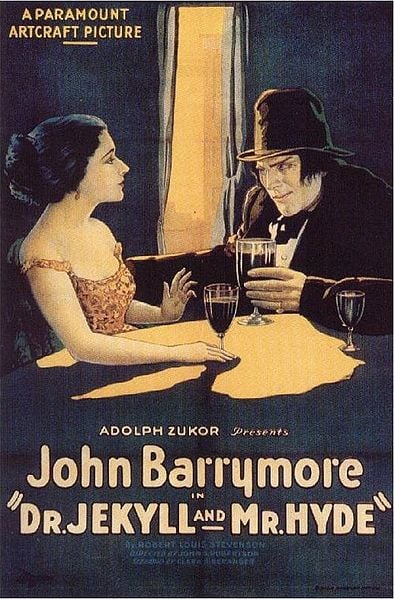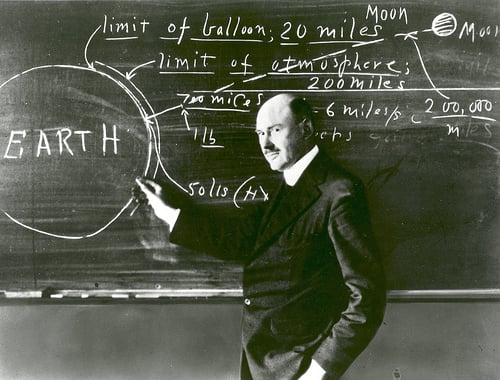The Clockwork Man (15)
By:
June 26, 2013

HILOBROW is pleased to present the fifteenth installment of our serialization of E.V. Odle’s The Clockwork Man. New installments will appear each Wednesday for 20 weeks.
Several thousand years from now, advanced humanoids known as the Makers will implant clockwork devices into our heads. At the cost of a certain amount of agency, these devices will permit us to move unhindered through time and space, and to live complacent, well-regulated lives. However, when one of these devices goes awry, a “clockwork man” appears accidentally in the 1920s, at a cricket match in a small English village. Comical yet mind-blowing hijinks ensue.
Considered the first cyborg novel, The Clockwork Man was first published in 1923 — the same year as Karel Capek’s pioneering android play, R.U.R.
“This is still one of the most eloquent pleas for the rejection of the ‘rational’ future and the conservation of the humanity of man. Of the many works of scientific romance that have fallen into utter obscurity, this is perhaps the one which most deserves rescue.” — Brian Stableford, Scientific Romance in Britain, 1890-1950. “Perhaps the outstanding scientific romance of the 1920s.” — Anatomy of Wonder (1995)
In September 2013, HiLoBooks will publish a gorgeous paperback edition of The Clockwork Man, with a new Introduction by Annalee Newitz, editor-in-chief of the science fiction and science blog io9. Newitz is also author of Scatter, Adapt, and Remember: How Humans Will Survive a Mass Extinction (2013) and Pretend We’re Dead: Capitalist Monsters in American Pop Culture (2006).
SUBSCRIBE to HILOBROW’s serialized fiction via RSS.
ALL EXCERPTS: 1 | 2 | 3 | 4 | 5 | 6 | 7 | 8 | 9 | 10 | 11 | 12 | 13 | 14 | 15 | 16 | 17 | 18 | 19 | 20
He delivered this last sentence rather in the manner of an ultimatum, and the Clockwork man seemed to brood over it for a few seconds He was apparently puzzled by the question, and hard mechanical lines appeared upon his forehead and began slowly chasing one another out of existence. It reminded the Doctor of Venetian blinds being pulled up and down very rapidly.
“Well,” the reply was shot out at last, “how do you work?” The repartee of the Clockwork man was none the less effective for being suspended, as it were, for a second or two before delivery.
The doctor gasped slightly and released his hold upon a mustard pot. He came up to the rebound with a new suggestion. “Now, that’s a good idea. We might arrive at something by comparison. I never thought of that.” He grasped the mustard pot again and tried to arrange certain matters in his mind. “It’s a little difficult to know where to begin,” he temporised.
“Begin at the end, if you like,” suggested the Clockwork man, affably. “It’s all the same to me. First and last, upside or inside, front or back — it all conveys the same idea to me.”
“We are creatures of action,” hazarded the Doctor, with the air of a man embarking upon a long mental voyage, “we act from certain motives. There is a principle known as Cause and Effect. Everything is related. Every action has its equal and opposite reaction. Nobody can do anything, or even think anything, without producing some change, however slight, in the general flow of things. Every movement that we make, almost every thought that passes through our minds, starts another ripple upon the surface of time, upon this endless stream of cause and effect.”
“Ah,” interrupted the Clockwork man, placing a finger to the side of his nose, “I begin to understand. You work upon a different principle, or rather an antiquated principle. You see, all that has been solved now. The clock works all that out in advance. It calculates ahead of our conscious selves. No doubt we still go through the same processes, sub-consciously, all such processes that relate to Cause and Effect. But we, that is, ourselves, are the resultant of such calculations, and the only actions we are conscious of are those which are expressed as consequents.”
Allingham passed a hand across his forehead. “It all seems so feasible,” he remarked, “once you grasp the mechanism. But what I don’t understand —”
Here, however, the discussion came to an abrupt conclusion, for something was happening to the Clockwork man.
The Clock
I
At first it seemed to the Doctor that his companion was about to explain matters further. There was still something vaguely communicative about his manner, and a kind of noise issued from his rapidly moving jaws.
But it was not a human noise. It began with a succession of deep-toned growls and grunts, and ended abruptly in a distinct bark.
“Hydrophobia,” flashed through the Doctor’s mind, but he dismissed the idea immediately. He had lit a cigarette in order to soothe his nerves. He was trying so hard to rationalise the whole proceeding, to fit the Clockwork man into some remotely possible order of things; but it was a difficult process, for no sooner had he grouped certain ideas in his head than some fresh manifestation took place which rendered all previous theories futile. At the present moment, for instance, it was obvious that some new kind of structural alteration was taking place in the Clockwork man’s physiognomy. The phenomenon could hardly be classed in the same category as the sudden growth of beard, although there were points in common. Hair was again visible, this time spread all over the rounded face and on the jaw; the nose was receding and flattening out; the eyes were dwindling in size, and the expression in them changed into a dull stare. The bark was repeated and followed by an angry rumbling.
The Doctor dropped his cigarette on the plate before him and grasped the edges of the table. His eyes were riveted upon that ghastly spectacle of transmutation.
“Oh, God,” he cried out, at last, and shivering from head to foot. “Are you doing these things on purpose to frighten me, or can’t you, can’t you help it? Do you think I don’t believe you? Do you think I can keep on deceiving myself? I tell you I’m ready to believe anything — I capitulate — I only ask you to let me down lightly. I’m only human, and human nerves weren’t made to stand this.”

“G-R-R-R-r-r-r-r-r,” growled the Clockwork man. “WOW — WOW — can’t help it — WOUGH — WOUGH — most regrettable — wow — wow — atavism — tendency to return — remote species — moment’s notice — family failing — Darwinism — better in a moment — something gone wrong with the controls. There — that’s done it. Phew!”
His face suddenly cleared, and all trace of the canine resemblance vanished as if by magic. He got up and took two or three jerk-like strides up and down the room.
“Must keep going — when I feel like this — either food or violent stimulus — otherwise the confounded thing runs down — and there you are.”
He paused and confronted Allingham, who had risen from his chair and was still trembling.
“How can I help it?” implored the Clockwork man, in despair. “They made me like this. I don’t want to alarm you — but, you know, it alarms me sometimes. You can’t imagine how trying it is to feel that at any moment you might change into something else — some horrible tree-climbing ancestor. The thing ought not to happen, but it’s always possible. They should have thought of that when they made the clock.”
“It mustn’t happen,” said the Doctor, recovering slightly, “that’s the flat fact. If it’s food you require, then food you shall have.”
It had suddenly flashed across his fevered mind that downstairs in the surgery there lay a collection of tinned foods and patent medicines, samples that had been sent for him to test. Rather than risk a further manifestation of collapse on the part of the Clockwork-man, he would sacrifice these.
He was only just in time. On the way down the stairs that led to the basement surgery the Clockwork man began to flap his ears violently, and it was then that the Doctor noticed for the first time this circumstance that had so puzzled Arthur Withers. But the faculty seemed, in comparison with other exhibitions, a mere trifle, a sort of mannerism that one might expect from a being so strangely constituted.
Pushing his companion into the surgery, the Doctor commenced opening tins for all he was worth. The process calmed him, and he had time to think a little. For half an hour he opened tins, and passed them over to the Clockwork man, without noticing very much what the latter did with them. Then he went on to bottles containing patent foods, phosphates, hypophosphates, glycero-hypophosphates, all the phosphates in fact, combined with malt or other substances, which might be considered almost necessary as an auxiliary diet for the Clockwork man.
At least, the latter seemed grateful to receive whatever was given to him, and his general manner became decidedly more possible. There seemed less chance now of a drastic relapse. The Doctor had locked the door of the surgery. It would be embarrassing to be discovered in such circumstances, and Mrs. Masters might faint with horror at the sight of the empty tins and bottles and the gorging visitor. It was symptomatic of the Doctor’s frame of mind that even now the one thing he dreaded more than anything else was the intrusion of a curious world into this monstrous proceeding. He had been forced into accepting the evidence of his own eyes, but there still remained in him a strong desire to hush up the affair, to protect the world at large from so fierce a shock to its established ideas.
The surgery was a low-pitched apartment, and it was approached by patients from the outside by way of the area steps. One door communicated with the dark passage that led to the kitchen quarters, and the other opened directly upon the area. A double row of shelves, well stocked with bottles, occupied the centre of the room and divided it into two halves. Beneath the window stood the Doctor’s neat bureau, and to the left of this was a low couch beside the wall. A shaded lamp on the desk was sufficient to light the room for ordinary purposes; but there was a gas burner near the further door, which had to be lit when the Doctor was engaged upon some very close examination or had to perform a slight operation. Directly underneath this burner there stood an arm-chair of ample proportions, and it was here that the Clockwork man had seated himself at the beginning of his orgy.
The Doctor sat upon the couch, with his hands limply hanging between his knees. He was conscious of perspiration, but made no attempt to wipe his forehead. His heart was knocking hard against his ribs, and occasionally missing a beat. He noticed this fact also, but it caused him little concern. Now and again he looked swiftly at the Clockwork man and studied his extraordinary method of mastication, the rapid vibratory movement of the jaws, the apparent absence of any kind of voluntary effort.
Uppermost in the Doctor’s mind was the reflection that he of all persons should have been selected by an undiscriminating providence to undergo this distressing and entirely unprecedented experience. It was an ironic commentary upon his reactionary views and his comfortable doctrine of common sense. He had been convinced in spite of himself, and the effort to resist conviction had strained his mental powers uncomfortably. He felt very strongly his inability to cope with the many problems that would be sure to arise in connection with the Clockwork man. It was too much for one man’s brain. There would have to be a convocation of all the cleverest men in Europe in order to investigate such an appalling revelation. He pictured himself in the act of introducing this genuine being from a future age, and the description he would have to give of all that had happened in connection with him. Even that prospect set his brain reeling. He would like to be able to shirk the issue. It was enough to have looked upon this archetype of the future; the problem now was to forget his existence.
But that would be impossible. The Clockwork man was the realisation of the future. There was no evading that. The future. Man had evolved into this. He had succeeded somehow in adding to his normal powers some kind of mechanism that opened up vast possibilities of action in all sorts of dimensions. There must have been an enormous preparatory period before the thing became finally possible, generations of striving and failure and further experiment. But the indefatigable spirit of man had triumphed in the end. He had arisen at last superior to Time and Space, and taken his place in the centre of the universe. It was a fulfilment of all the prophecies of the great scientists since the discovery of evolution.
Such reflections flitted hazily through the Doctor’s mind as he strove in vain to find a practical solution of the problem. What was the clock? He knew, from hearsay, that it was situated at the back of this strange being’s head. Tom Driver had seen it, and described it in his clumsy fashion. Since that episode the Doctor had visualised something in the nature of an instrument affixed to the Clockwork man’s head, and perhaps connected with his cerebral processes. Was it a kind of super-brain? Had there been found some means of lengthening the convolutions of the human brain, so that man’s thought travelled further and so enabled him to arrive more swiftly at ultimate conclusions? That seemed suggestive. It must be that in some way the cerebral energy of man had been stored up, as electricity in a battery, and then released by mechanical processes.
At least, that was the vague conclusion that came into the Doctor’s mind and stuck there. It was the only theory at all consonant with his own knowledge of human anatomy. All physiological action could be traced to the passage of nervous energy from one centre to another, and it was obvious that, in the case of the Clockwork man, such energy was subjected to enormous acceleration and probably distributed along specially prepared paths. There was nothing in the science of neuropathy to account for such disturbances and reactions There were neural freaks — the Doctor had himself treated some remarkable cases of nervous disorder — but the behaviour of the Clockwork man could not be explained by any principle within human knowledge. Not the least puzzling circumstance about him was the fact that now and again his speech and manner made it impossible to accept the supposition of mechanical origin; whilst at other times his antics induced a positive conviction that he was really a sort of highly perfected toy.
RADIUM AGE SCIENCE FICTION: “Radium Age” is HILOBROW’s name for the 1904–33 era, which saw the discovery of radioactivity, the revelation that matter itself is constantly in movement — a fitting metaphor for the first decades of the 20th century, during which old scientific, religious, political, and social certainties were shattered. This era also saw the publication of genre-shattering writing by Edgar Rice Burroughs, Sax Rohmer, E.E. “Doc” Smith, Jack London, Arthur Conan Doyle, Aldous Huxley, Olaf Stapledon, Karel Čapek, H.P. Lovecraft, Charlotte Perkins Gilman, Yevgeny Zamyatin, Philip Gordon Wylie, and other pioneers of post-Verne/Wells, pre-Golden Age “science fiction.” More info here.
HILOBOOKS: The mission of HiLoBooks is to serialize novels on HiLobrow; and also, as of 2012, operating as an imprint of Richard Nash’s Cursor, to reissue Radium Age science fiction in beautiful new print editions. So far, we have published Jack London’s The Scarlet Plague, Rudyard Kipling’s With the Night Mail (and “As Easy as A.B.C.”), Arthur Conan Doyle’s The Poison Belt, H. Rider Haggard’s When the World Shook, Edward Shanks’s The People of the Ruins, William Hope Hodgson’s The Night Land, and J.D. Beresford’s Goslings. Forthcoming: E.V. Odle’s The Clockwork Man, Cicely Hamilton’s Theodore Savage, and Muriel Jaeger’s The Man with Six Senses. For more information, visit the HiLoBooks homepage.
SERIALIZED BY HILOBOOKS: Richard Connell’s “The Most Dangerous Game” | Jack London’s The Scarlet Plague | Rudyard Kipling’s With the Night Mail (and “As Easy as A.B.C.”) | Arthur Conan Doyle’s The Poison Belt | H. Rider Haggard’s When the World Shook | serialized between March and August 2012; Edward Shanks’ The People of the Ruins, serialized between May and September 2012; William Hope Hodgson’s The Night Land, serialized between June and December 2012; J.D. Beresford’s Goslings, serialized between September 2012 and May 2013; E.V. Odle’s The Clockwork Man, serialized between March and July 2013; and Cicely Hamilton’s Theodore Savage, serialized between March and August 2013.


